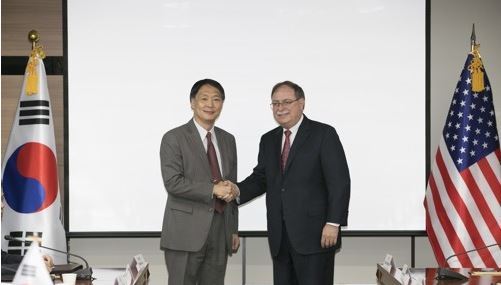In thorny defense-cost sharing talks with South Korea, the United States has created a new category -- operational support -- in an apparent bid to sharply raise Seoul's share of the costs, officials here said Tuesday.
It's a major sticking point in the Special Measures Agreement negotiations, as the two sides are preparing for another round of bargaining late next month.
 |
(Yonhap) |
The allies had the fifth round of talks last week at Joint Base Lewis-McChord near Seattle.
The US choice of the venue was strategic as JBLM is a training and mobilization center for its armed forces that would be used in the event of an emergency in Korea.
The SMA talks are aimed at setting how much Seoul will pay for the stationing of the US Forces Korea, currently totaling around 28,000.
The Trump administration, however, is seeking to expand the scope to American troops outside the peninsula who are deployed here occasionally or to be sent if needed.
Shortly after the two-day SMA negotiations at the military installation, the State Department tweeted, "Round highlights the newly proposed Operational Support category by showcasing #JBLM units supporting @USForcesKorea."
For decades, South Korea has shared the cost of stationing USFK in three sectors -- payroll, construction and logistics -- in a bid to support its stable presence against North Korea's military threats.
Seoul is paying around 960 billion won ($850 million) this year under the latest five-year accord, a steep hike from 150 billion won in 1991, government data showed. The contract is to expire at the end of this year.
The US is pressing South Korea to pay far more, especially in the name of operational support costs, which includes the deployment of so-called strategic assets such as aircraft carrier, long-range bombers and nuclear subs to Korea.
South Korea wants to cover related costs in financial support for the USFK's logistics.
"South Korea's position is that the new category of operational support is unacceptable," a government official told reporters.
"The two sides agreed to redouble efforts to reach an agreement on the basis of the alliance spirit and mutual trust."
A problem is the difficulty of figuring out the expense for the operation of strategic assets and other operational support directly connected to the defense of South Korea.
The Trump administration has floated a new regional strategy demonstrated in renaming the Pacific Command to the Indo-Pacific Command.
It may herald a shift toward the USFK taking a role in dealing with broader security threats in Asia, beyond deterrence on the peninsula.
The next session is to open in the fourth week of August in South Korea and the exact schedule has yet to be fixed, he added.
Earlier meetings took place in Honolulu in March, on Jeju Island in April and in Washington, D.C. in May and in Seoul in June. (Yonhap)






![[Herald Interview] 'Trump will use tariffs as first line of defense for American manufacturing'](http://res.heraldm.com/phpwas/restmb_idxmake.php?idx=644&simg=/content/image/2024/11/26/20241126050017_0.jpg)
![[Health and care] Getting cancer young: Why cancer isn’t just an older person’s battle](http://res.heraldm.com/phpwas/restmb_idxmake.php?idx=644&simg=/content/image/2024/11/26/20241126050043_0.jpg)
